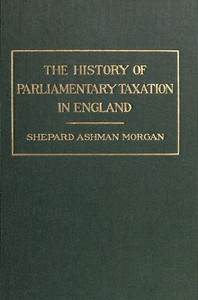The History of Parliamentary Taxation in England by Shepard Ashman Morgan
"The History of Parliamentary Taxation in England" by Shepard Ashman Morgan is a historical account written in the early 20th century. This work delves into the evolution of taxation in England from the time of the Anglo-Saxons through key events such as the Norman Conquest, the establishment of Magna Carta, and the gradual shift toward parliamentary control over taxation. The book explores the changing dynamics of authority regarding tax implementation, focusing on
the transition from royal edict to parliamentary approval. The opening of the text provides insights into the early concepts of taxation during the Saxon period, indicating that this system relied on voluntary contributions based on loyalty rather than imposed taxes. It highlights how the king, with the consent of assemblies like the Witenagemot, established early forms of revenue collection, including extraordinary levies like the Danegeld during foreign threats. As the narrative progresses, it suggests that taxation became a critical aspect of governance, setting the stage for the controversies and developments that ultimately contributed to the establishment of parliamentary taxation in the centuries to come. (This is an automatically generated summary.)
Read or download for free
| How to read | Url | Size | |||
|---|---|---|---|---|---|
| Read now! | https://www.gutenberg.org/ebooks/53189.html.images | 571 kB | |||
| EPUB3 (E-readers incl. Send-to-Kindle) | https://www.gutenberg.org/ebooks/53189.epub3.images | 271 kB | |||
| EPUB (older E-readers) | https://www.gutenberg.org/ebooks/53189.epub.images | 270 kB | |||
| EPUB (no images, older E-readers) | https://www.gutenberg.org/ebooks/53189.epub.noimages | 243 kB | |||
| Kindle | https://www.gutenberg.org/ebooks/53189.kf8.images | 437 kB | |||
| older Kindles | https://www.gutenberg.org/ebooks/53189.kindle.images | 392 kB | |||
| Plain Text UTF-8 | https://www.gutenberg.org/ebooks/53189.txt.utf-8 | 414 kB | |||
| Download HTML (zip) | https://www.gutenberg.org/cache/epub/53189/pg53189-h.zip | 235 kB | |||
| There may be more files related to this item. | |||||
Similar Books
About this eBook
| Author | Morgan, Shepard Ashman |
|---|---|
| Author of introduction, etc. | Smith, Theodore Clarke, 1870-1960 |
| LoC No. | 11007249 |
| Title | The History of Parliamentary Taxation in England |
| Note | Reading ease score: 56.5 (10th to 12th grade). Somewhat difficult to read. |
| Credits | E-text prepared by Giovanni Fini, deaurider, and the Online Distributed Proofreading Team (http://www.pgdp.net) from page images generously made available by Internet Archive (https://archive.org) |
| Language | English |
| LoC Class | HJ: Social sciences: Public finance |
| Subject | Taxation -- Great Britain |
| Subject | Taxation -- Great Britain -- History |
| Category | Text |
| EBook-No. | 53189 |
| Release Date | Oct 1, 2016 |
| Most Recently Updated | Jun 13, 2020 |
| Copyright Status | Public domain in the USA. |
| Downloads | 162 downloads in the last 30 days. |
| Project Gutenberg eBooks are always free! | |


